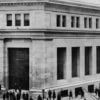Few economic subjects are more tangled, more confused than money. Quarrels abound over “tight money” vs. “easy money,” over the roles of the Federal Reserve System and the Treasury, over various versions of the gold standard, etc. Should the government pump money into the economy or siphon it out? Which branch of the government? Should it encourage credit or restrain it? Should it return to the gold standard? If so, at what rate? These and countless other questions multiply, seemingly without end. Perhaps the Babel of views on the money question stems from man’s tendency to be “realistic,” i.e., to study only immediate political and economic problems. If we immerse ourselves wholly in day-to-day affairs, we cease making fundamental distinctions, or asking the really basic questions. Soon, basic issues are forgotten, and aimless drift is substituted for firm adherence to principle.
Often we need to gain perspective, to stand aside from our everyday affairs in order to understand them more fully. This is particularly true in our economy, where interrelations are so intricate that we must isolate a few important factors, analyze them, and then trace their operations in the complex world. This was the point of “Crusoe economics,” a favorite device of classical economic theory. Analysis of Crusoe and Friday on a desert island, much abused by critics as irrelevant to today’s world, actually performed the very useful function of spotlighting the basic axioms of human action. Of all the economic problems, money is possibly the most tangled, and perhaps where we most need perspective. Money, moreover, is the economic area most encrusted and entangled with centuries of government meddling.
Money
Many people—many economists—usually devoted to the free market stop short at money. Money, they insist, is different. The government must supply and regulate it. They never think of state control of money as interference in the free market; a free market in money is unthinkable to them. Governments must mint coins, issue paper, define “legal tender,” create central banks, pump money in and out, “stabilize the price level,” etc.
Historically, money was one of the first things controlled by government, and the free market “revolution” of the eighteenth and nineteenth centuries made very little dent in the monetary sphere. So it is high time that we turn fundamental attention to the life-blood of our economy— money. Let us first ask ourselves the question: Can money be organized under the freedom principle? Can we have a free market in money as well as in other goods and services? What would be the shape of such a market? And what are the effects of various governmental controls? If we favor the free market in other directions, if we wish to eliminate government invasion of person and property, we have no more important task than to explore the ways and means of a free market in money.
Rothbard shows precisely how banks create money out of thin air and how the central bank, backed by government power, allows them to get away with it. He shows how exchange rates and interest rates would work in a true free market. When it comes to describing the end of the gold standard, he is not content to describe the big trends. He names names and ferrets out all the interest groups involved. A very good read.




